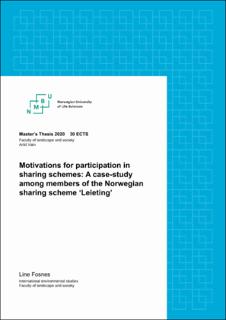| dc.description.abstract | New forms of consumption may be required due to increasing environmental degradation. One of the suggested solutions is to challenge individual ownership by participating in the relatively new sharing economy. The objective of this study has been to explore motivations among consumers in Norway who share physical assets with other consumers on a temporary basis through sharing schemes. This objective was specified into the following research questions: What motivates sharing behavior? What characterizes the values and personal capabilities among consumers who share physical assets in sharing schemes? How do consumers who share physical assets in sharing schemes experience the role of contextual factors?
To answer the research questions, a qualitative research method was employed. Data was collected through semi-structured interviews among 18 respondents who either had rented or rented out physical assets through the sharing scheme Leieting in Norway.
The results showed that motivations to share are not a uniform phenomenon. They vary in content, number, type of rationality, between transactional roles and may change over time. A key finding is that motivations of consumers who rent assets are largely based on individual rationality, whereas motivations of consumers who rent out assets frequently include both social and individual rationality. Furthermore, the values among consumers who share physical assets seem to be largely characterized by ‘self-transcendence’ and ‘openness to change’, whilst their socio-economic characteristics vary. Their personal capabilities in the form of technical and social skills required for participation can for the most part be characterized as sufficient. In general, consumers seem to experience the role of contextual factors in the form of technological design and safety as respectively satisfying and important. Regarding the physical difficulty of sharing, the results indicated that consumers who rent physical assets experience reduced time and effort required as a facilitating aspect, whereas regarding consumers who rented out, it was indicated that experience of rental administration were associated to specific types of motivation. The results did furthermore lead to the suggestion that social proof may be of importance for individuals to start renting out physical assets, and that norms within established groups may transcend out of the groups towards sharing schemes. Finally, tax did not seem to be experienced as important for the participation of the respondents who rented out assets. | en_US |

